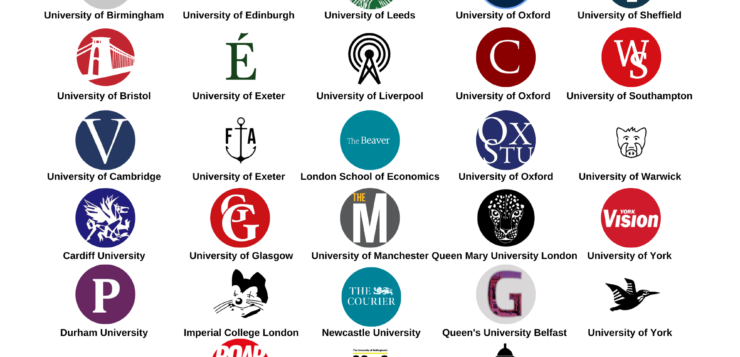As the editors of Russell Group student newspapers, we are writing collectively to request a reversal of the Russell Group’s statement, 7 January 2020, ‘on ensuring fair assessment and protecting the integrity of degrees.’
As editors, not only are we students or recent students ourselves but we are also in constant contact with the students at our respective universities, as part of the function of our extracurricular roles. Apart from sharing in their collective experiences, we have a unique insight into their attitudes, viewpoints and beliefs. We speak and listen to them every day – and every day since the beginning of this academic year, we have heard students calling for more understanding, cooperation and empathy from university management.
The statement shared by the Russell Group on 7 January showed the inconsistencies between what they and we understand to be adequate teaching. Whilst we enormously appreciate the hard work of teaching staff under these challenging circumstances and understand the complications ‘blended learning’ has presented, students have repeatedly said they have not been adequately supported throughout this pandemic. This is by no means to disregard the tremendous efforts of university staff, but it is simply a consequence of the realities of a year like none other in living memory.
The lack of a ‘no detriment’ or ‘safety net’ policy has been a miscalculation by the Russell Group. Students across the UK have been left feeling abandoned by both the government, devolved administrations and universities themselves.
As the editors of all 24 Russel Group universities’ student papers, we pick up and record the views of our students on a regular basis. What many are telling us, as a result of personal and shared difficulties, is that they do require the support a clearer ‘no detriment’ policy would deliver.
We object to the assumption made by the Russell Group that ‘emergency measures’ are no longer ‘necessary’ or ‘appropriate’. We are living through what are undeniably unprecedented times – this is a global emergency. The Prime Minister has labelled these weeks of the third lockdown as the critical point in the UK’s fight against the pandemic – death tolls are high, hospitals have reached capacity, we are still just in the early days of administering vaccines. Students, locked down in various levels of economic and social stability across the nation, are facing some of the most important exams we have sat in our lives to date – under some of the most difficult circumstances many will have faced. International students, too, have been working all term from various time zones around the globe, detached from the support of their student communities.
If anything, this point in the pandemic is perhaps the most urgent. We are now facing a mental health crisis amongst young people. Figures by WONKHE and Trendence have shown that more students feel lonely and isolated on a daily basis as a result of the pandemic. Additionally, surveys of undergraduates by various higher education policy advisers have found that over 50 per cent of students say their mental health has significantly deteriorated during the course of the pandemic.
Students are attempting to sit assessments with a lack of resources, varying internet connections and mixed home environments. There are students without desks, who share bedrooms with siblings, who have caring responsibilities when they’re at home. Across the country, there are students from wide and varied backgrounds who are struggling to study for their final year assessments, many also affected by illness and bereavement owing to COVID-19. Students from lower income families as well as estranged students are disproportionately affected in their learning experiences this year and less able to receive the traditional means of support. They do not deserve to be dismissed.
Yet, no one from the Russell Group denied the emergency of the situation when metal fences were erected around halls at Manchester. Universities even went as far as to declare their own local emergencies by locking down individual residences during outbreaks amongst first years. There was no denial of ‘emergency’ when students were being blamed in the media for spikes in national COVID-19 cases.
A-level and GCSE exams have been adjusted to as if this were an emergency – so why aren’t the Russell Group responding in the same way for university students?
It should also be noted the UK government have voided themselves of much of the responsibility for the problems students face. On January 15, the Minister of State for Universities Michelle Donelan tweeted that ‘if universities want to continue charging full fees, they are expected to maintain the quality, quantity and accessibility of tuition’. A government who demands this from its universities should put support systems in place to enable it.
You have explained to our respective Student Unions that it is more appropriate for universities to provide ‘a range of policies and tools’ to ensure fair assessment for students. Whilst we agree some universities will need to adapt their policy on an individual basis, the Russell Group’s collective position against ‘no detriment’ or ‘safety net’ policy does not match the reality of what many students have faced, and are continuing to face, this year.
In principle, a ‘no detriment’ or ‘safety net’ policy should ensure a student’s grade is not worsened as a result of the pandemic. Currently, many of your universities’ mitigatory policies amount to simply offering more time for assessments. Frankly, a matter of extra days or a week is not sufficient for the challenges that we have outlined above, which students are facing in real time.
We understand that an algorithmic approach is not entirely viable due to the lack of benchmark data for many students at this stage of the 2020/21 academic year – that’s a mathematical given. But it is by no means impossible to support an alternative ‘no detriment’ policy built for the circumstances. The University of York, for instance, is implementing a comprehensive policy, attempting to take into account the unique challenges posed by this pandemic, as opposed to reshuffling and extending existing policies.
By readjusting the weightings of each year towards a student’s overall degree and choosing the better of the two for penultimate- and final-year undergraduates, as well as allowing first-years to re-sit up to 90 failed credits in exams, the University of York have worked to try and introduce an appropriate and fair policy. Postgraduates, who should not be forgotten in any such policy, have also been offered an assured ‘safety net’. Overall, it is certainly not perfect but it at least strives to fulfill on the principle of ‘no detriment’, allowing students to simply focus on their studies, with some confidence they will not be impacted by COVID-19, whilst preserving the value of their degrees to employers.
We urge all Russell Group universities to introduce similarly comprehensive policies.
Whilst we understand that every subject, university and student is different, showing the understanding and empathy to their students embodied in York’s approach should be a basic requirement.
Presently, there are a small number of universities, such as Cardiff, that have recently implemented similar policies. Yet their commitment to this editorial is on the basis that students from all Russell Group universities should have the same level of assurance.
Overall, many students will of course respect and largely agree with your desire to maintain degree standards comparative to other years and to ensure, as you say, that they still ‘command the confidence of employers and professional bodies’. However, where other aspects of society have shifted or seen unprecedented measures introduced over the course of the last year, we believe a reweighting or rescaling of degrees is certainly possible. The students we write for and hear from daily are not asking for a policy that allows them to stop working or learning, but one that simply acknowledges the reality of the pandemic and its wide-ranging impact.
Ultimately, you claim you want to uphold the integrity of our degrees. Yet a university’s first responsibility is to its students and acting with integrity ought to mean upholding this responsibility. Many students across the country have not received the ‘blended’ or ‘hybrid’ learning experience they were promised; many are now separated from their campuses, with its facilities and libraries, due to a third national lockdown brought about largely by an unforeseen variant; many are facing personal, long-term hardship as a result of the virus, and/or extreme difficulties at home.
The integrity of a degree, too – students would hope – should encompass a focus on the opportunity to learn and study as well as a focus on rankings and outcomes. The integrity of university institutions should entail safeguarding the mental wellbeing of its students. Under the current plans laid out by most Russell Group universities, students are reporting to us loudly that neither of these are currently in line.
Students have not been quiet about their concerns. With exams fast approaching, and some already underway, now is the time for Russell Groups universities to act compassionately and responsibly.




